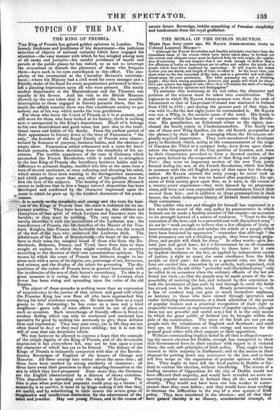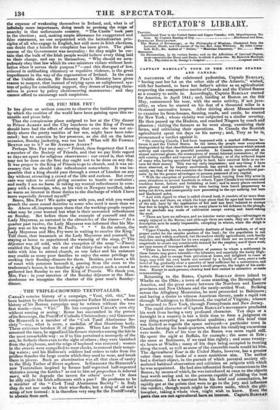THE MORAL OF THE DUBLIN ELECTION.
MORE than forty years ago, Sir Itaern ABERCROMBIE wrote to Colonel LORENZO MOORE—.
" Although the French Revolution and Jacobin principles may have been the immediate cause of the events which have lately taken place in Ireland, yet the remote and ultimate cause must be derived from its true origin, the oppres- sion of centuries. Do not imagine that I am weak enough to believe that a few effusions of lenity or benevolence are to soften and subdue the minds of a people which have been hardened by oppression. It will require the wisest system you can devise, and length of time, to effect it. In the mean time, you must trust to the due execution of the laws, and to a powerful and well-disci- plined army, for your protection. The Irish peasantry are not a thinking people ; they have strong prejudices, however, and people will think for them; till a new system has begun to take effect, they will remain the tools of a foreign enemy, or of domestic agitators and demagogues." To estimate this testimony at its full value, the character and position of the witness must be taken into consideration. The regiment in which Sir RALPH ABERCROMBIE rose from the rank of Lieutenant to that of Lieutenant-Colonel was stationed in Ireland from 1763 to 1781; and during the greater part of that time, he was with it—for the last eight years he commanded it. Sir RALPH was not a Whig, in the modern sense of the word. His family is one of those which has become of consequence since the ,Revolu- tion. His grandfather, an Edinburgh writer to the signet, pur- chased the family estate in Clackmannanshire. The family was one of those new Whig families, (in the old Scotch acceptation of the phrase,) by their skill in managing whom the DUNDASES ori- ginally acquired importance. They were members of the dominant party in Scotland, which, acting at the commencement of the reign of GEORGE the Third as a compact body, drew down upon them- selves the vituperation of the City patriots of London, and were by their vituperation provoked to form a devoted section of the new party formed by the cooperation of that King and the younger PITT: they were an important section of the new Tory party formed during the wra of the French Revolution, which has little in common with the old English party of that name but the desig- nation. Sir RALPH entered the army young; he never took an active part in politics; he was no hunter after popularity ; his opi- nions of Irish society grew upon him, as it were, in the course of a twenty-years' experience—they were biassed by no preposses- sions, and were not even expressed until circumstances forced their avowal from him ; and in addition to these presumptions in their favour, the whole subsequent history of Ireland bears testimony to their correctness.
The soldier who saw and thought for himself has expressed in a few words the secret of the only policy by perseverance in which Ireland can be made a healthy metnber of the empire—an accession to its strength instead of a source of weakness. "Trust to the due execution of the laws, and to a powerful and well-disciplined army": do not be "weak enough to believe that a few effusions of lenity or benevolence are to soften and subdue the minds of a people which have been hardened by oppression": remember that although "the Irish peasantry are not a thinking people, they have strong prejus dices, and people will think for them." In other words—give lie- land just and good laws ; let t' e Government be on all occasions scrupulously exact in its conformity to those laws; let it earn by implicit obedience to the law, as applied by independent courts of justice, a right to exact the same obedience from the Irish people on their part : let them, as a general rule, see that the laws are carried into execution by an orderly, well-organized, civil police; and let the aid ofthe "powerful well-disciplined army" only be called in on occasions when the ordinary officers of the law are found too weak ; so that the people may be made aware of the im- possibility of resistinab the law, and induced by this conviction to seek the attainment of just ends by and through it, until the habit has struck root in the public mind. Steady perseverance I,. such a line of conduct may not gain so much immediate applause, as leniency to those who have sinned through ignorance and under irritating circumstances, or a frank admission of the power of popular leaders and a practical recognition of their right to respectful treatment as representatives of popular opinion, (though these too are graceful and useful acts.) but it is the only means by which the great public of Ireland can be brought within the pale of the constitution. The mass of the Irish are not yet one people with the inhabitants of England and Scotland ; and until they are, no Ministry can act with energy and success for the genera'!good either with their support or their opposition.
Without commanding implicit belief in all that is alleged respect- ing the recent election for Dublin, enough has transpired to show that Government have in their conduct with regard to it violated
these, the only safe principles of Irish policy. They ought to have trusted to their majority in Parliament, and to the means at their
disposal for putting down any resistance to the law, and to have left free scope to the expression of popular opinion within the law. They ought to have left the local parties in Dublin or Ire-
land to contest the election, without interfering. The return of a
leading member of Opposition for the city of Dublin would not have affected their majority, and would have revealed no more re- specting popular sentiment in Ireland than all the world knows already. They would not have been one iota weaker in conse- quence than they were before ; and they would have done nothing
to increase the difficulties in the way of a wise system of Irish policy. They have interfered in the election ; and all that they have gained thereby is an illusory, unsubstantial triumph, at the expense of weakening themselves in Ireland, and, what is of infinitely more importance, doing much to prolong the reign of anarchy in that unfortunate country. "The Castle" took part in the election ; and, making ample allowance for exaggerated and false statement, no one acquainted with the latitudinarian prin- ciples of all who engage in English, but still more in Irish elections, can doubt that a handle for complaint has been given. The plain course of the Government was neutrality : for they might be cer- tain that the bulk of the Irish people would believe every thing laid to their charge, and say to themselves, "Why should we scru- pulously obey that law which its own ministers violate without hesi- tation when it serves their purpose ?"—and this disregard of law, evinced in unblushing chicanery or repulsive violence, is the great impediment in the way of the regeneration of Ireland. In the case of the Dublin election, Sir ROBERT Pzees Ministry have given reason to suspect, that instead of relying upon an enlightened sys- tem of policy for conciliating support, they dream of keeping them- selves in power by paltry electioneering manceuvres: and they cannot afford to encourage such suspicions.



























 Previous page
Previous page